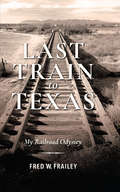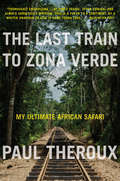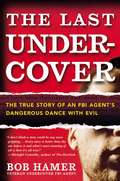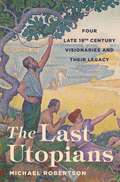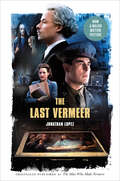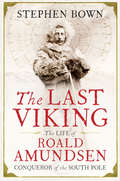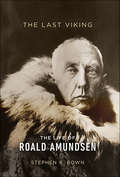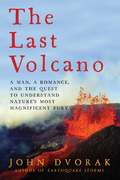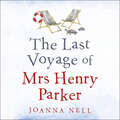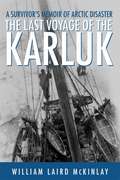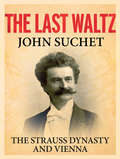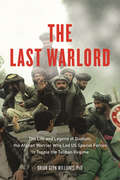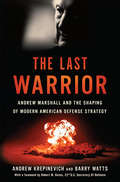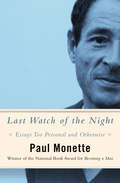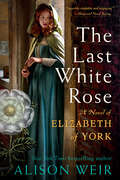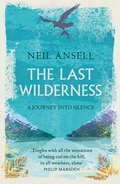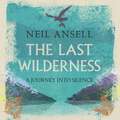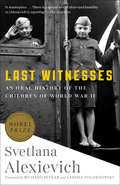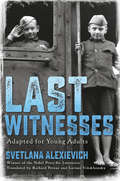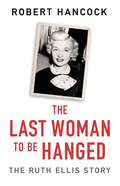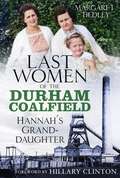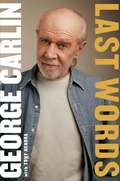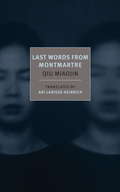- Table View
- List View
Last Train to Texas: My Railroad Odyssey (Railroads Past And Present Ser.)
by Fred W. FraileyA veteran railroad columnist takes readers on a wild ride through the American train industry with remembrances that crisscross the country and the world.In Last Train to Texas, author Fred W. Frailey examines the workings behind the railroad industry and captures incredible true stories along the way. He vividly portrays the industries larger-than-life characters, such as William “Pisser Bill” F. Thompson, who weathered financial ruin, bad merger deals, and cutthroat competition, all while racking up enough notoriety to inspire a poem titled “Ode to a Jerk.”Whether he’s riding the Canadian Pacific Railway through a blizzard, witnessing a container train burglary in the Abo Canyon, or commemorating a poem to Limerick Junction in Dublin, Frailey’s journeys are rife with excitement, incident, and the spirit of the rails. Filled with humorous anecdotes and thoughtful insights into the railroading industry, Last Train to Texas is a grand adventure for the railroad connoisseur.
The Last Train to Zona Verde: My Ultimate African Safari
by Paul TherouxThe acclaimed author of Dark Star Safari journeys across western Africa in this &“thoroughly engrossing [and] at times tragic&” travelogue (Washington Post).Paul Theroux&’s best-selling Dark Star Safari chronicled his epic overland voyage from Cairo to Cape Town, providing an insider&’s look at modern Africa. Now, with The Last Train to Zona Verde, he returns to discover how both he and Africa have changed in the ensuing years. Traveling alone, Theroux sets out from Cape Town, going north through South Africa, Namibia, then into Angola, encountering a world increasingly removed from tourists&’ itineraries and the hopes of postcolonial independence movements. After covering nearly 2,500 arduous miles, Theroux cuts short his journey, a decision he chronicles with unsparing honesty in a chapter titled &“What Am I Doing Here?&” Vivid, witty, and beautifully evocative, The Last Train to Zona Verde is a fitting final African adventure from the writer whose gimlet eye and effortless prose have brought the world to generations of readers. &“If this book is proof, age has not slowed Theroux or encouraged him to rest on his achievements . . . Gutsy, alert to Africa's struggles, its injustices and history.&” — San Francisco Chronicle
The Last Undercover: The True Story of an FBI Agent's Dangerous Dance with Evil
by Bob HamerA 26-year veteran of the FBI reflects on the challenges he has endured and overcome, as he stared the dark side of humanity in the face and never blinked.
The Last Utopians: Four Late Nineteenth-Century Visionaries and Their Legacy
by Michael RobertsonThe entertaining story of four utopian writers—Edward Bellamy, William Morris, Edward Carpenter, and Charlotte Perkins Gilman—and their continuing influence todayFor readers reared on the dystopian visions of Nineteen Eighty-Four and The Handmaid's Tale, the idea of a perfect society may sound more sinister than enticing. In this lively literary history of a time before "Orwellian" entered the cultural lexicon, Michael Robertson reintroduces us to a vital strain of utopianism that seized the imaginations of late nineteenth-century American and British writers.The Last Utopians delves into the biographies of four key figures--Edward Bellamy, William Morris, Edward Carpenter, and Charlotte Perkins Gilman—who lived during an extraordinary period of literary and social experimentation. The publication of Bellamy's Looking Backward in 1888 opened the floodgates of an unprecedented wave of utopian writing. Morris, the Arts and Crafts pioneer, was a committed socialist whose News from Nowhere envisions a workers' Arcadia. Carpenter boldly argued that homosexuals constitute a utopian vanguard. Gilman, a women's rights activist and the author of "The Yellow Wallpaper," wrote numerous utopian fictions, including Herland, a visionary tale of an all-female society.These writers, Robertson shows, shared a belief in radical equality, imagining an end to class and gender hierarchies and envisioning new forms of familial and romantic relationships. They held liberal religious beliefs about a universal spirit uniting humanity. They believed in social transformation through nonviolent means and were committed to living a simple life rooted in a restored natural world. And their legacy remains with us today, as Robertson describes in entertaining firsthand accounts of contemporary utopianism, ranging from Occupy Wall Street to a Radical Faerie retreat.
The Last Vermeer: Unvarnishing the Legend of Master Forger Han van Meegeren
by Jonathan Lopez“A grand yarn of twisty deceit, involving prestigious dupes and scads of money, with a sensational trial at the finish.” —The New YorkerIt’s a story that made Dutch painter Han van Meegeren world-famous when it broke at the end of World War II: A lifetime of disappointment drove him to forge Vermeers, one of which he sold to Hermann Goering in mockery of the Nazis. And it’s a story that’s been believed ever since. Too bad it isn't true.Jonathan Lopez has drawn on never-before-seen documents from dozens of archives for this long-overdue unvarnishing of Van Meegeren’s legend. Neither unappreciated artist nor antifascist hero, Van Meegeren emerges as an ingenious, dyed-in-the-wool crook. Lopez explores a network of illicit commerce that operated across Europe: Not only was Van Meegeren a key player in that high-stakes game in the 1920s and ’30s, landing fakes with famous collectors such as Andrew Mellon, but he and his associates later cashed in on the Nazi occupation.Nominated for an Edgar Award and made into a film starring Guy Pearce, The Last Vermeer is a revelatory biography of the world’s most famous forger—a talented Mr. Ripley armed with a paintbrush—and a deliciously detailed story of deceit in the art world.Includes photographs“His pioneering research on van Meegeren’s early life gives us further insight into what motivates deception, a subject that will never cease to fascinate as long as art is bought and sold.” —ARTNews“Brings hard light to van Meegeren’s machinations and (very bad) character.” —The New Yorker“Fascinating . . . Lopez’s writing is witty, crisp and vigorous, his research scrupulous and his pacing dynamic.” —Publishers Weekly (starred review)“A terrific read.” —Houston Chronicle“It’s hard to imagine improving on Lopez’s gem of a tale.” —Los Angeles TimesPreviously published as The Man Who Made Vermeers
The Last Viking: The Life of Roald Amundsen, Conqueror of the South Pole (A\merloyd Lawrence Book Ser.)
by Stephen BownThis “fascinating biography” of the Norwegian explorer who beat Robert Scott to the South Pole is “intelligent and often thrilling” (London Sunday Times).The most feted explorer of his generation, Roald Amundsen counted the discovery of the Northwest Passage, in 1905, as well as the North Pole amongst his greatest achievements. His revolutionary approach to technology transcends polar and nautical significance. However, until now, his story has rarely featured as more than a footnote to Scott’s tragic failure.Reviled for defeating Scott but worshipped by his men, Amundsen was pursued by women and creditors throughout his life before disappearing on a mission to rescue an Italian explorer attempting to claim the North Pole for Mussolini. The Last Viking is the life of a visionary and a showman, who brought the era of Shackleton to an end, put the newly independent Norway on the map, and was the twentieth century’s brightest trailblazing explorer.
The Last Viking: The Life of Roald Amundsen (A Merloyd Lawrence Book)
by Stephen R. BownThe Last Viking unravels the life of the man who stands head and shoulders above all those who raced to map the last corners of the world. In 1900, the four great geographical mysteries—the Northwest Passage, the Northeast Passage, the South Pole, and the North Pole—remained blank spots on the globe. Within twenty years Roald Amundsen would claim all four prizes. Renowned for his determination and technical skills, both feared and beloved by his men, Amundsen is a legend of the heroic age of exploration, which shortly thereafter would be tamed by technology, commerce, and publicity. Féted in his lifetime as an international celebrity, pursued by women and creditors, he died in the Arctic on a rescue mission for an inept rival explorer. Stephen R. Bown has unearthed archival material to give Amundsen’s life the grim immediacy of Apsley Cherry-Garrard’s The Worst Journey in the World, the exciting detail of The Endurance, and the suspense of a Jon Krakauer tale. The Last Viking is both a thrilling literary biography and a cracking good story.
The Last Volcano: A Man, a Romance, and the Quest to Understand Nature's Most Magnificent Fury
by John DvorakRanging from Yellowstone in Wyoming to Mount Pelee in the Caribbean, from Bogoslof and Pavlov in Alaska, to Sakurajima in Japan, and, finally, to the massive volcanoes of Kilauea and Mauna Loa in Hawaii—The Last Volcano reveals the incredible journey of a man on a mission to understand the awesome power of volcanic eruptions. Volcanoes have fascinated—and terrified—people for ages. They have destroyed cities and ended civilizations. John Dvorak, the acclaimed author of Earthquake Storms, looks into the early scientific study of volcanoes and the life of the man who pioneered the field, Thomas Jaggar. Educated at Harvard, Jaggar went to the Caribbean after Mount Pelee exploded in 1902, killing more than 26,000 people. Witnessing the destruction and learning about the horrible deaths these people had suffered, Jaggar vowed to dedicate himself to a study of volcanoes. What followed was fifty years of global travel to eruptions in Italy, Alaska, Central America, Japan and the Pacific. In 1912, he built a small science station at the edge of a lake of molten lava at Kilauea volcano in the Hawaiian Islands, with the goal of solving the mystery of why volcanoes erupt and how they could be predicted. Jaggar found something else at Kilauea: true love. She was Isabel Maydwell, a widowed school teacher who came to Kilauea to restart her life. For more than twenty ears, she and Jaggar ran the science station, living in a small house at the edge of a high cliff that overlooked the lava lake. Maydwell would quickly becoming one of the world’s most astute observers of volcanic activity. Mixed with tales of myths and rituals, as well as the author’s own experiences and insight into volcanic activity, The Last Volcano reveals the lure and romance of confronting nature in its most magnificent form—the edge of a volcanic eruption.
The Last Voyage of Mrs Henry Parker: An unforgettable love story from the author of Kindle bestseller THE SINGLE LADIES OF JACARANDA RETIREMENT VILLAGE
by Joanna NellA poignant ode to love and the memories that make a well-lived life, from the author of THE SINGLE LADIES OF JACARANDA RETIREMENT VILLAGE As the wife of retired ship's doctor Dr Henry Parker, Evelyn is living out her twilight years aboard the Golden Sunset. Every night she dresses for dinner - gown, tiara, runners - and regales her fellow passengers with stories of a glamorous life travelling the world in luxury, as well as showing off her superior knowledge of everything from ships' customs to biographical details of her heroine, Florence Nightingale. The crew treat her with deference. And forbearance. But when Henry goes missing, Evelyn sets off to search every part of the grand ocean liner to find him, casino, nightclub and off-limits areas included. Misadventures are had, new friends are made, scandalous behaviour noted - all news to Evelyn. If only she could remember the events of the night before as clearly as she can recall the first time she met Henry on a passage from England to Australia in 1953 and fell in love, abandoning her dreams to become a midwife to be a wife instead - and the long-ago painful events that left Evelyn all at sea. Why is it so hard to forget some things and so hard to remember others? And where is Henry?(p)2019 Hachette Australia
The Last Voyage of the Karluk
by William Laird MckinlayAn astonishing narrative of disaster and perseverance, The Last Voyage of the Karluk will thrill readers of adventure classics like Into Thin Air and The Climb. In 1913, explorer Vilhjalmur Stefansson hired William McKinlay to join the crew of the Karluk, the leading ship of his new Arctic expedition. Stefansson's mission was to chart the waters north of Alaska; yet the Karluk's crew was untrained, the ship was ill-suited to the icy conditions, and almost at once the Karluk was crushed-at which point Stefansson abandoned his crew to continue his journey on another ship. This is the only firsthand account of what followed: a nightmare struggle in which half the crew perished, one was mysteriously shot, and the rest were near death by the time of their rescue twelve months later.Written some sixty years after the fact, and drawing extensively on his own daily log, McKinlay's narrative of this doomed expedition is rendered with remarkable clarity of recollection, and with a combination of horror and a level of self-possession that, to modern eyes, may seem incredible. Like most of his companions, McKinlay was inexperienced, without a day's training in the skills essential to survival in the Arctic. Yet he and many of his fellow crewmen, with the help of an Eskimo family accustomed to such conditions, survived a year under the harshest of conditions, enduring 80-mile-per-hour gales and temperatures well below zero with only the barest of provisions and almost no hope of contact with civilization.Nearly a century later, this remains one of the most compelling survival stories ever written-an extraordinary testament to man's overpowering will to live.
The Last Waltz: The Strauss Dynasty and Vienna
by John SuchetCaptured in a beautiful package, including more than fifty color photographs, The Last Waltz tells the intriguing story of of the Viennese Strauss family known for producing some of the best known, best loved music of the nineteenth century. Johann and Josef Strauss, the Waltz Kings, composed hundreds of instantly recognizable and enduringmelodies, including The Blue Danube Waltz, Tales from the Vienna Woods, Voices of Spring and The Radetzky March. Their iconic music has been featured on the scores of nearly a thousand films.Yet despite their success, this was a family riven with tension, feuds and jealousy, living in a country that was undergoing seismic upheaval. Through the personal and political chaos, the Strauss family continued to compose music to which the Viennese - anxious to forget their troubles - could dance and drank champagne, even as their country hurtled towards oblivion at the hands of the First World War. Classical music expert and radio host John Suchet skillfully portrays this gripping story, capturing the family dramas, the tensions, triumphs and disasters against the turbulent backdrop of Austria in the nineteenth century, from revolution to regicide.
The Last Warlord: The Life and Legend of Dostum, the Afghan Warrior Who Led US Special Forces to Topple the Taliban Re
by Brian WilliamsChronicling the spectacular rise to power of General Abdul Rashid Dostum, this is an intimate profile of the one of the most powerful warlords to have dominated Afghanistan in the years since the Soviet withdrawal in the late 1980s. His rise from simple peasant villager to warrior against the repressive policies of the Taliban and Al Qaeda is told by one of the few outsiders to be accepted into Dostum's stronghold in the northern deserts of Afghanistan. Thanks to this unprecedented access, author Brian Glyn Williams was able to conduct lengthy interviews with Dostum and his family, as well as his subcommanders, local chieftains, mullahs, Taliban enemies, prisoners of war, and women's rights activists. What emerges is an intensely personal account of the Mongol warlord, detailing his childhood, motivations, hopes for his country, and conviction that it is time for a new generation of Western-trained technocrats to shape his country's destiny. With the drawing down of U.S. troops in 2014 and Dostum poised to reenter the world stage to fight a resurgent Taliban, this timely analysis provides important historical context to the controversy swirling around Afghanistan's warlord culture and is an essential contribution to the debate on Afghanistan's future.
The Last Warrior: Andrew Marshall and the Shaping of Modern American Defense Strategy
by Andrew F. Krepinevich Barry D. WattsAndrew Marshall is a Pentagon legend. For more than four decades he has served as Director of the Office of Net Assessment, the Pentagon's internal think tank, under twelve defense secretaries and eight administrations. Yet Marshall has been on the cutting edge of strategic thinking even longer than that. At the RAND Corporation during its golden age in the 1950s and early 1960s, Marshall helped formulate bedrock concepts of US nuclear strategy that endure to this day; later, at the Pentagon, he pioneered the development of "net assessment"-a new analytic framework for understanding the long-term military competition between the United States and the Soviet Union. Following the Cold War, Marshall successfully used net assessment to anticipate emerging disruptive shifts in military affairs, including the revolution in precision warfare and the rise of China as a major strategic rival of the United States.In The Last Warrior, Andrew Krepinevich and Barry Watts-both former members of Marshall's staff-trace Marshall's intellectual development from his upbringing in Detroit during the Great Depression to his decades in Washington as an influential behind-the-scenes advisor on American defense strategy. The result is a unique insider's perspective on the changes in US strategy from the dawn of the Cold War to the present day.Covering some of the most pivotal episodes of the last half-century and peopled with some of the era's most influential figures, The Last Warrior tells Marshall's story for the first time, in the process providing an unparalleled history of the evolution of the American defense establishment.
Last Watch of the Night: Essays Too Personal and Otherwise
by Paul MonetteTender and passionate autobiographical essays by the National Book Award–winning author of Becoming a Man. &“Does it go too fast?&” Monette asks about life at the beginning of one piece. The answer is a resounding &“yes&” for the individuals who populate this stunning work of nonfiction. These ten autobiographical essays memorialize those whose lives have been claimed by AIDS. Following Becoming a Man and Borrowed Time, Last Watch of the Night is Monette&’s third and final self-portrait. In this collection, he confronts death—those of lovers and friends, and even his own eventual demise—with both bravery and compassion.This ebook features an illustrated biography of Paul Monette including rare images and never-before-seen documents from the Paul Monette papers of the UCLA Library Special Collections.
The Last White Rose: A Novel of Elizabeth of York
by Alison WeirNew York Times bestselling author Alison Weir explores the turbulent life of Henry VIII&’s mother, Elizabeth, the first queen of the Tudor dynasty, in this &“superbly readable and engaging&” (Historical Novels Society) novel. Elizabeth of York is the oldest daughter of King Edward IV. Flame-haired, beautiful, and sweet-natured, she is adored by her family; yet her life is suddenly disrupted when her beloved father dies in the prime of life. Her uncle, the notorious Richard III, takes advantage of King Edward&’s death to grab the throne and imprison Elizabeth&’s two younger brothers, the rightful royal heirs. Forever afterward known as "the Princes in the Tower," the boys are never seen again. On the heels of this tragedy, Elizabeth is subjected to Richard&’s overtures to make her his wife, further legitimizing his claim to the throne. King Richard has murdered her brothers, yet she feels she must accept his proposal.As if in a fairy tale, Elizabeth is saved by Henry Tudor, who challenges Richard and defeats him at the legendary Battle of Bosworth Field. Following his victory, Henry becomes king and asks Elizabeth to be his wife, the first queen of the Tudor line. The marriage is happy and fruitful, not only uniting the warring houses of Lancaster and York—the red and white roses—but producing four surviving children, one of whom, Henry VIII, will rule the country for the next thirty-six years.As in her popular Six Tudor Queens series, Alison Weir captures the personality of one of Britain&’s most important consorts, conveying Elizabeth of York&’s dramatic life in a novel that is all the richer because of its firm basis in history.
The Last Wilderness: A Journey into Silence
by Neil AnsellNeil Ansell's THE LAST WILDERNESS is a mesmerising book on nature and solitude by a writer who has spent his lifetime taking solitary ventures into the wild. For any readers of the author's previous book, DEEP COUNTRY, Robert Macfarlane's THE OLD WAYS or William Atkins THE MOOR.Shortlisted for the 2018 Wainwright Golden Beer Book PrizeShortlisted for the 2018 Highland Book Prize 'Ansell has the rare skill of combining vividly the intimacy of detail and the astonishing grandeur of this North West coastline of Scotland. Through his keen eyes we look again at the familiar with a sense of wondrous revelation' Madeleine Bunting 'Beautiful...a testimony to reticent courage' Daily MailThe experience of being in nature alone is here set within the context of a series of walks that Neil Ansell takes into the most remote parts of Britain, the rough bounds in the Scottish Highlands. He illustrates the impact of being alone as part of nature, rather than outside it.As a counterpoint, Neil Ansell also writes of the changes in the landscape, and how his hearing loss affects his relationship with nature as the calls of the birds he knows so well become silent to him.
The Last Wilderness: A Journey into Silence
by Neil AnsellNeil Ansell's THE LAST WILDERNESS is a mesmerising book on nature and solitude by a writer who has spent his lifetime taking solitary ventures into the wild. For any readers of the author's previous book, DEEP COUNTRY, Robert Macfarlane's THE OLD WAYS or William Atkins THE MOOR.Shortlisted for the 2018 Wainwright Golden Beer Book PrizeShortlisted for the 2018 Highland Book Prize 'Ansell has the rare skill of combining vividly the intimacy of detail and the astonishing grandeur of this North West coastline of Scotland. Through his keen eyes we look again at the familiar with a sense of wondrous revelation' Madeleine Bunting 'Beautiful...a testimony to reticent courage' Daily MailThe experience of being in nature alone is here set within the context of a series of walks that Neil Ansell takes into the most remote parts of Britain, the rough bounds in the Scottish Highlands. He illustrates the impact of being alone as part of nature, rather than outside it.As a counterpoint, Neil Ansell also writes of the changes in the landscape, and how his hearing loss affects his relationship with nature as the calls of the birds he knows so well become silent to him.
The Last Wilderness: A Journey into Silence
by Neil AnsellNeil Ansell's THE LAST WILDERNESS is a mesmerising book on nature and solitude by a writer who has spent his lifetime taking solitary ventures into the wild. For any readers of the author's previous book, DEEP COUNTRY, Robert Macfarlane's THE OLD WAYS or William Atkins THE MOOR.'A gem of a book, an extraordinary tale. Ansell's rich prose will transport you to a real life Narnian world that C.S.Lewis would have envied. Find your deepest, most comfortable armchair and get away from it all' CountryfileThe experience of being in nature alone is here set within the context of a series of walks that Neil Ansell takes into the most remote parts of Britain, the rough bounds in the Scottish Highlands. He illustrates the impact of being alone as part of nature, rather than outside it.As a counterpoint, Neil Ansell also writes of the changes in the landscape, and how his hearing loss affects his relationship with nature as the calls of the birds he knows so well become silent to him.(P)2018 Headline Publishing Group Ltd
Last Witnesses: An Oral History of the Children of World War II
by Svetlana AlexievichFrom the Nobel Prize-winning writer, an oral history of children’s experiences in World War II across Russia—in the vein of The Unwomanly Face of War and Secondhand Time <P><P>For more than three decades, Svetlana Alexievich has been the memory and conscience of the twentieth century. <P><P>When the Swedish Academy awarded her the Nobel Prize, it cited her for inventing “a new kind of literary genre,” describing her work as “a history of emotions . . . a history of the soul.” <P><P>Bringing together dozens of voices in her distinctive style, Last Witnesses is Alexievich’s collection of the memories of those who were children during World War II. They had sometimes been soldiers as well as witnesses, and their generation grew up with the trauma of the war deeply embedded—a trauma that would change the course of the Russian nation. <P><P>Collectively, this symphony of children’s stories, filled with the everyday details of life in combat, reveals an altogether unprecedented view of the war. Alexievich gives voice to those whose memories have been lost in the official narratives, uncovering a powerful, hidden history from the personal and private experiences of individuals. <P><P>Translated by the renowned Richard Pevear and Larissa Volokhonsky, Last Witnesses is a powerful and poignant account of the central conflict of the twentieth century, a kaleidoscopic portrait of the human side of war.
Last Witnesses (Adapted for Young Adults)
by Svetlana AlexievichA powerful portrait of the personal consequences of war as seen through the innocent eyes of children, from a Nobel Prize-winning writer.Nobel Prize-winning writer Svetlana Alexievich delves into the traumatic memories of children who were separated from their parents during World War II--most of them never to be reunited--in this this young adult adaptation of her acclaimed nonfiction "masterpiece" (The Guardian), Last Witnesses: An Oral History of the Children of WWII.The personal narratives told by those who were children during WWII and survived harrowing experiences, are astounding. So many children were separated from their loved ones in the midst of the terror and chaos. As a result, some grew up in orphanages or were raised by grandparents or extended family; others were taken in and cared for by strangers who risked punishment for such acts. Still others lived on their own or became underage soldiers. Forthright and riveting, these bravely told oral histories of survival reveal the heart-rending details of life during wartime while reminding us that resilience is possible, no matter the circumstances.
The Last Woman to be Hanged: The Ruth Ellis Story
by Robert HancockOn the eve of her hanging, Ruth Ellis wrote to a friend: 'I must close now but remember I am quite happy with the verdict, but not the way the story was told, there is so much that people don't know.' Ruth Ellis was the last woman to be hanged in Britain. This is her story.In July 1955 Ruth Ellis was sentenced to death for the shooting of her lover, motor-racing driver David Blakely. Barely three months later she was executed at Holloway prison. In this book, Robert Hancock sets the record straight. Using official documents including the transcript of her trial at the Old Bailey, he unlocks the full, secret background to the story of the last woman to be hanged in Britain. Meticulous and fair in its analysis, The Last Woman to be Hanged is an absorbing portrait of the tragic life of a young woman, a vivid snapshot of an era and a gripping account of a notorious case that shocked the nation.
The Last Woman to be Hanged: The Ruth Ellis Story
by Robert HancockOn the eve of her hanging, Ruth Ellis wrote to a friend: 'I must close now but remember I am quite happy with the verdict, but not the way the story was told, there is so much that people don't know.' Ruth Ellis was the last woman to be hanged in Britain. This is her story.In July 1955 Ruth Ellis was sentenced to death for the shooting of her lover, motor-racing driver David Blakely. Barely three months later she was executed at Holloway prison. In this book, Robert Hancock sets the record straight. Using official documents including the transcript of her trial at the Old Bailey, he unlocks the full, secret background to the story of the last woman to be hanged in Britain. Meticulous and fair in its analysis, The Last Woman to be Hanged is an absorbing portrait of the tragic life of a young woman, a vivid snapshot of an era and a gripping account of a notorious case that shocked the nation.
The Last Women of the Durham Coalfield: Hannah's Granddaughter (Women of the Durham Coalfield #3)
by Margaret Hedley'As this book shows, the women of the Durham coalfield played an equal role in shaping daily life and trajectories of history in the region, just as women today are building their own futures in communities around the world.' - Hillary Rodham Clinton The final book in a series charting the true family history of a Durham coal-mining family, which started in the 1830s The Second World War took its toll on all sections of society. The appeal for women to work outside of the home in the many ammunition factories to support the war effort was taken up by many women from the colliery villages. They worked for eight hours at the factory, taking up their care-giving roles and all that involved, when they returned home. Their days continued to be long and strenuous. After the war the government introduced a series of initiatives intended to improve the lives of the nation. A reformed education system was introduced in 1944, nationalization in 1947 and a national health service in 1948. At last things were looking up for coal-mining families. With this bright new horizon, little did the women in Hannah's family realize that they would represent the last generation of women of the Durham Coalfield.
Last Words
by George Carlin Tony HendraThis ebook features added multimedia content: an interview with George Carlin's daughter Kelly about life with her dad and a tribute video with interviews with Susie Essman, Michael Ian Black, Richard Belzer, George Wendt, and Jeffrey Ross, who talk about Carlin's incredible ability to make people laugh.Last Words is pure, unapologetic, hilarious George Carlin. With 19 appearances on the Johnny Carson show, 13 HBO specials, 5 Grammys, a critical Supreme Court battle over censorship, and countless appearances on the international comedy circuit, George Carlin saw it all and made fun of most of it. Blending his signature acerbic humor with never before told stories from his own life, this book is part comedy routine, part memoir, and all original. His journey to stardom began in the rough and tumble neighborhoods of New York in the 1950's, where class and culture wars planted the seeds for some of his earliest material including the infamous Seven Dirty Words sketch. Carlin describes his major influences as an up and coming comic, talking about the origins of some of his most famous stand up routines. The people he encountered on his rise to stardom reads like a Who's Who of 1970's celebrity, from Lenny Bruce who took him under his wing to Hugh Hefner who gave him his first big shot. Carlin spares no details as he describes his life and career. He discusses his own battle with substance abuse, his turbulent relationships with the women in his life, and the politics that informed so much of his stand up. From the high points on stage to low points in the hospital, Last Words is George Carlin's life told with the brash, unblinking honesty that defined his comedy and made him one of the best loved comedians in history.
Last Words from Montmartre
by Qiu Miaojin Ari Larissa HeinrichAn NYRB Classics OriginalWhen the pioneering Taiwanese novelist Qiu Miaojin committed suicide in 1995 at age twenty-six, she left behind her unpublished masterpiece, Last Words from Montmartre. Unfolding through a series of letters written by an unnamed narrator, Last Words tells the story of a passionate relationship between two young women--their sexual awakening, their gradual breakup, and the devastating aftermath of their broken love. In a style that veers between extremes, from self-deprecation to pathos, compulsive repetition to rhapsodic musings, reticence to vulnerability, Qiu's genre-bending novel is at once a psychological thriller, a sublime romance, and the author's own suicide note.The letters (which, Qiu tells us, can be read in any order) leap between Paris, Taipei, and Tokyo. They display wrenching insights into what it means to live between cultures, languages, and genders--until the genderless character Zoë appears, and the narrator's spiritual and physical identity is transformed. As powerfully raw and transcendent as Mishima's Confessions of a Mask, Goethe's The Sorrows of Young Werther, and Theresa Cha's Dictée, to name but a few, Last Words from Montmartre proves Qiu Miaojin to be one of the finest experimentalists and modernist Chinese-language writers of our generation.
